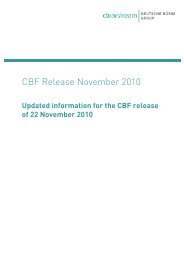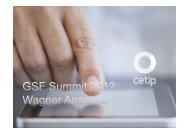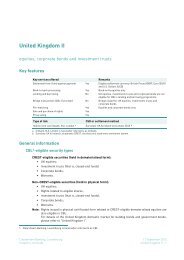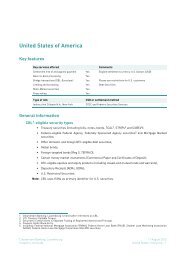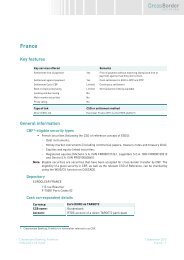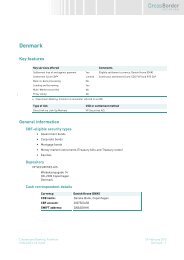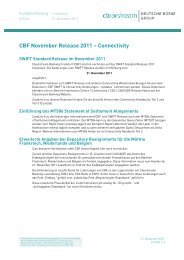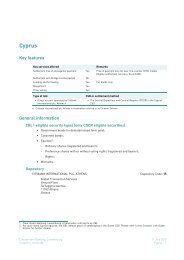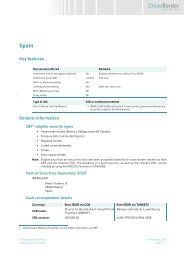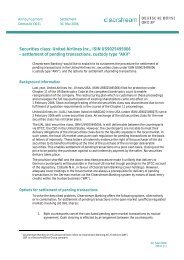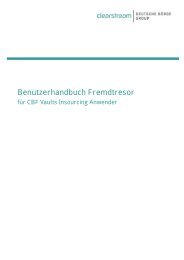Indonesia - Clearstream
Indonesia - Clearstream
Indonesia - Clearstream
Create successful ePaper yourself
Turn your PDF publications into a flip-book with our unique Google optimized e-Paper software.
Registration<br />
Fixed income securities<br />
Most bonds are bearer instruments and registration is not required.<br />
<strong>Indonesia</strong><br />
Equities<br />
Registration is done automatically by crediting the book-entry/scripless securities to the KSEI account.<br />
The account holder is considered to be the registered owner.<br />
Physical securities are registered upon receipt of the investor’s instruction or a standing instruction.<br />
Certificates must be endorsed under the investor’s name before registration. The registration process<br />
may take up to 14 business days depending on the number of certificates; during the corporate action<br />
peak season, this period may be longer.<br />
Neither a central registrar nor the nominee concept are recognised in <strong>Indonesia</strong>. Physical shares are<br />
registered with each individual issuer and the appointed registrar.<br />
Account structure at KSEI<br />
The central depository (KSEI) requires direct participants (custodian banks, brokers) to open stock<br />
accounts for their clients. Such accounts are on account level (that is, <strong>Clearstream</strong> Banking) and not on<br />
final beneficiary basis. Clients may open a sub-account showing the name of the final beneficiary in<br />
order to benefit from any Double Taxation Treaty agreement.<br />
In the event of KSEI bankruptcy, the assets under custody are considered to be third-party’s assets and<br />
as such will not be included in KSEI’s own assets but will be distributed as per the KSEI’s records.<br />
Account structure at BI<br />
BI, as the central registry, will only deal with banks (for proprietary holdings) and with sub-registries -<br />
that is, custodians - (for third-party holdings).<br />
Each sub-registry maintains an omnibus account and a single cash account at BI to facilitate settlement<br />
of government bonds (GDS) and BI certificates (SBI) and, in turn, investors must open accounts with the<br />
sub-registries. The accounts at sub-registry level should reflect the owner of the GDS and SBI (that is,<br />
client’s name “for and behalf of” the owner).<br />
Stamp duty<br />
Stamp duty is not applicable in the <strong>Indonesia</strong>n market.<br />
Penalties (buy-ins etc.)<br />
All stock exchange trades must settle on T+3. If any shortage of securities is not covered by T+3, KPEI<br />
will impose a penalty called the “Alternate Cash Settlement” (ACS).<br />
ACS is 125% of the highest market value between T+0 and T+3. If the broker does not have sufficient<br />
cash to pay the penalty, KPEI will use the guarantee fund to cover the short cash position and substitute<br />
the relevant buying broker. The selling broker will be suspended for the day pending investigation by the<br />
JSX.<br />
Brokers that are aware of insufficient securities on T+3 have the option to buy them from the cash<br />
market (T+0 settlement cycle) or via the Securities Borrowing programme. KPEI will net off the broker’s<br />
position as of SD from the cash market and the regular market.<br />
Buying brokers with insufficient cash on T+3 will be suspended and KPEI will use the guarantee fund to<br />
cover the obligations. Before suspending the broker, KPEI checks whether the broker has other<br />
collateral, including offline collateral such as time deposits or bank guarantees pledged to KPEI.<br />
<strong>Clearstream</strong> Banking<br />
20 December 2011<br />
Market Profile <strong>Indonesia</strong> - 9



